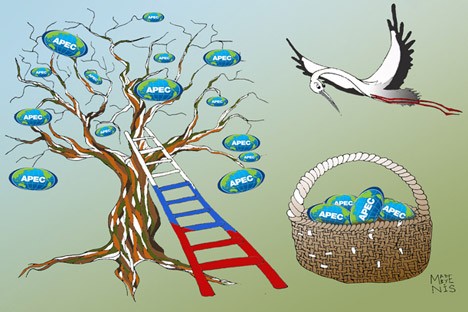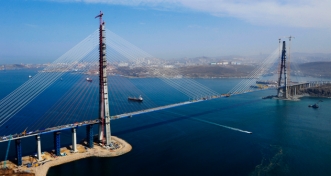APEC fosters pragmatic partnerships with a global dimension

Click to enlarge the image. Drawing by Anisia Boroznova
Despite the turbulence the global economy is experiencing, the Asia-Pacific region is firmly established as a leader of world development. This opens up new prospects for Russia, which is a natural part of the region. The Asia-Pacific Economic Cooperation (APEC) forum offers additional opportunities for advancing our interests in the region.
There is much talk today about the “Asian pivot” of America’s foreign policy. One often hears the question whether the same is happening in Russian diplomacy. The answer is simple: Russia’s history and geography have ordained that we develop links both with the West and with the East. The European Union is our biggest economic and political partner. While strengthening our positions in Asia we intend to preserve our gains in Europe. If you add the intensive development of integration in the Eurasian space, spearheaded by Russia, and our accession to the World Trade Organisation, a fairly complete picture emerges of a pragmatic, multi-direction network diplomacy envisaged under the foreign policy concept adopted in 2008. Russian public opinion is united on this front. The question is the speed of this process, but it is determined by the logic of the integration processes.
Today, APEC comprises 21 regional economies. They are dynamic, economically and technologically developed countries, including the U.S., China and Japan. APEC accounts for 40 percent of the Earth’s population, 54 percent of world GDP and 44 percent of global trade. The region has achieved a high level of economic integration. The share of mutual trade among its participants is almost 70 percent of total foreign trade. Relations in this sphere are governed by, among other things, 44 free-trade agreements. Both shores of the Pacific are working vigorously within APEC to create a single free-trade area.
Russia’s accession to APEC was a considered decision of our country which has put it on the path of market development and fully fledged integration into the world economy. Our participation in APEC activities has vindicated the strategic validity of that decision.
The APEC summit held in Vladivostok on Sept. 8–9 under Russian chairmanship was no exception. Leaders have agreed approaches to overcoming the consequences of the global financial and economic crisis, the development of regional integration processes, and the formation of a new, equitable and fair configuration of economic links in the Asia-Pacific region. Particular attention was paid to solving the practical tasks of counteracting protectionism, protecting investments and stimulating their flow into hi-tech sectors. An agreement on transparency in concluding free-trade pacts was reached. Important early steps were made towards combining integration in the Eurasian and Asia-Pacific regions.
In terms of innovation, Russian initiatives towards creating a common APEC education space, establishing co-ordination between the research and academic communities, and encouraging dialogue between educational institutions and businesses have been approved. We have initiated partnerships in the field of scientific, technological and innovative policy involving representatives of governments, business and science.
Russia has made a considerable contribution to the discussion of food security in order for APEC to boost productivity in the agrarian sector and to stabilise the food markets. This will provide the socially vulnerable with greater access to food and attract more investment into agriculture. A special APEC partnership was initiated to this end.
We have also offered to make greater use of Russia’s transit potential to diversify regional transport corridors with the active use of advanced satellite and computer systems, including Glonass.
Trade liberalisation now goes hand-in-hand with environmental protection. The Vladivostok summit approved a list of 54 “environmental goods” for which APEC countries are planning to cut customs duties to 5 percent or less by 2015.
On the whole, the agreements achieved mark an important step towards creating a regional system for free and open investment and trade activities. The summit also ensured progress in the implementation of Russia’s strategic course for joining regional and integration processes with the aim of modernising and developing our country, especially Siberia and the Far East.
Our trade with the APEC economies is already developing vigorously: their share in Russia’s foreign trade increased from 16.4 percent in 2002 to 23.9 percent in 2011. That increasing trend looks set to continue.
The success of Vladivostok, and the large scale of the decisions taken there, reflect a new balance of forces in the global economy. In particular, all the participants must think strategically and proactively. This may not be so apparent looking at it from outside, from Europe. But I can assure you that, in a spirit of noblesse oblige, all our APEC partners are aware of their responsibility for the success of our joint undertaking. Indeed, they all share the view that economic development and its changing paradigm create the basis for tackling all of the other problems that society faces.
Alexander Yakovenko is Ambassador of the Russian Federation to the United Kingdom. He was previously Deputy Minister of Foreign Affairs of the Russian Federation.
All rights reserved by Rossiyskaya Gazeta.
Subscribe
to our newsletter!
Get the week's best stories straight to your inbox

